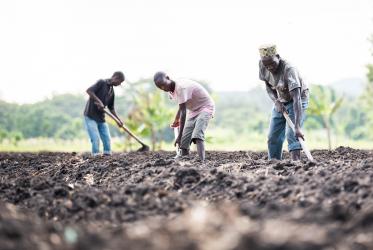* By Fredrick Nzwili
A conference discussing how to overcome hunger, and sustain justice and peace in the Horn of Africa, ended in Nairobi, Kenya on 29 June with faith leaders and partner organizations calling for urgent action to tackle famine, a frequent experience in the region.
The religious leaders, church agency development officials, practitioners and theologians drawn from countries facing droughts and war met against a backdrop of the hunger crisis in the region.
In February this year, the UN declared famine in South Sudan - the world’s youngest nation, where 50 percent of the population will be affected through the summer months. Situations in other countries like Kenya, Burundi, Somalia, Ethiopia and Uganda, are being viewed as fragile and worrying.
“The meeting provided updates, helped analyze the situation and planning for the future,” said Manoj Kurian, coordinator of the World Council of Churches’ Ecumenical Advocacy Alliance (WCC-EAA) at a 27-29 June meeting of the All Africa Conference of Churches (AACC) in Nairobi.
According to Kurian, it is a difficult situation in the area, where millions of people - an estimated 20 million in the whole region - are starving.
“We are talking about a very serious problem, it’s not just conflict but conflict combined with severe drought – leading to crop failure,” he said. “We need to take steps to stop the conflicts, but we also need to find ways to help communities survive.”
Drought and climate change is one facet of the crisis. The others are conflict resolution and governance.
The meeting, organized by WCC, AACC and ACT Alliance, World Vision International and the World Food Programme, builds on the unity and momentum gained on 21 May celebrations of the Global Day of Prayer, which sought to highlight the challenges faced in the region following the unprecedented food crisis.
A Call to Action is being finalized from the discussions. It gives clear actions - such as tree-planting, seed distribution and seed banking, strengthened partnerships, better farming methods, and monitoring of policies, among other actions - to help tackle the challenge.
Committing to the document, the leaders say they are also keen to move forward with it, while sharing and communicating their experiences from these actions in their areas.
“The call to action which we have come up with and which now makes sure the church is acting and also engaging political leadership is a key development,” noted Nicta Lubaale, general secretary of the Organization of African Instituted Churches.
The leaders note that some emergency response and support is needed to ensure that people don’t die of hunger, but also articulate that the solutions are long term.
“The situation is very dire (in South Sudan). Areas have been declared in western Upper Nile and Unity state, but also around Juba and other states. The hunger is very acute,” said Bishop Dr Isaiah Dau, the general overseer of the Sudan Pentecostal Church.
At the same time, he is going home convinced of his people’s need to engage in agriculture, plant trees and grow own food, rather than wait for relief.
Faith communities mobilize in Nairobi to fight hunger and sustain Horn of Africa
WCC-EAA Food for Life Campaign







